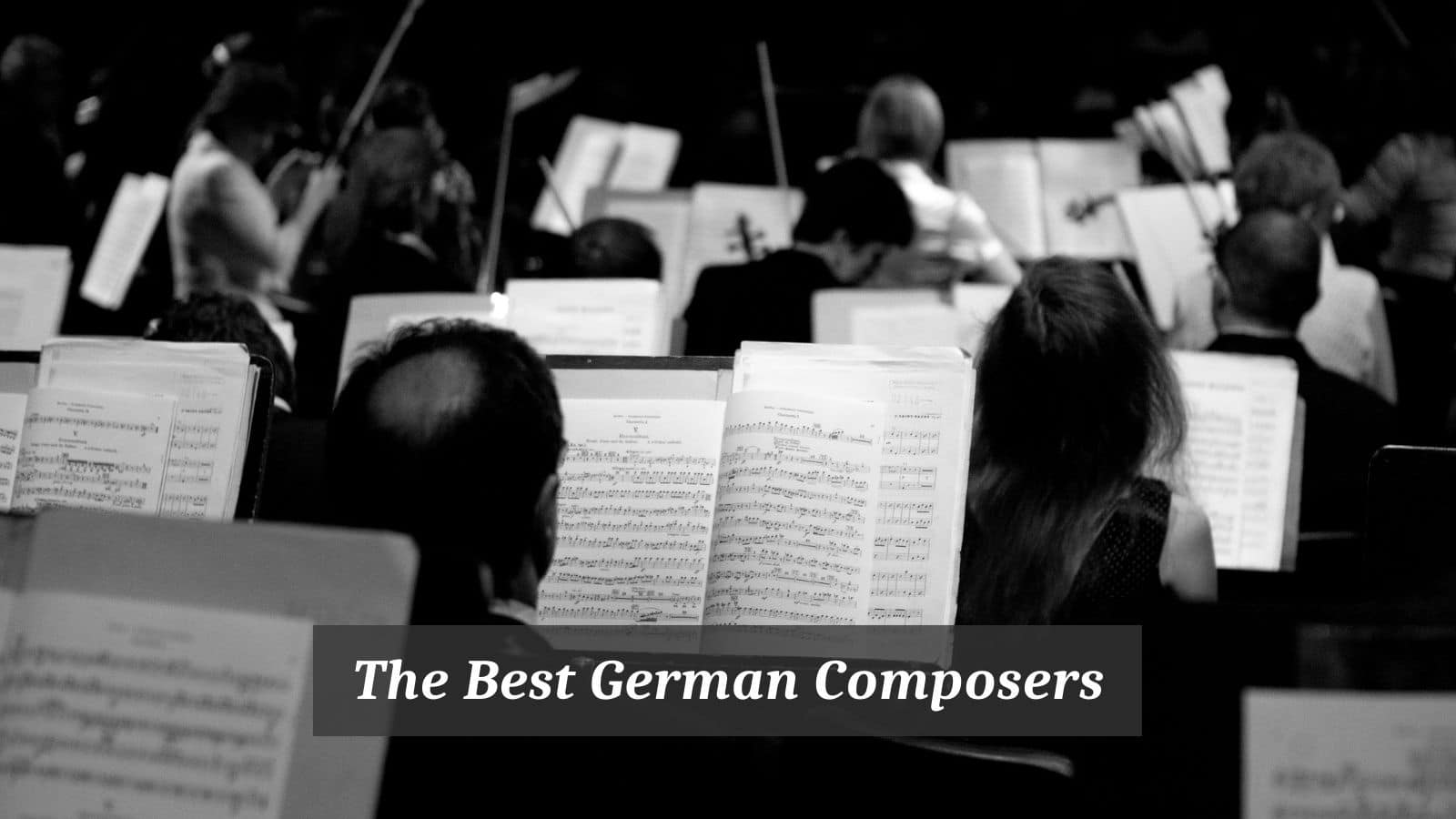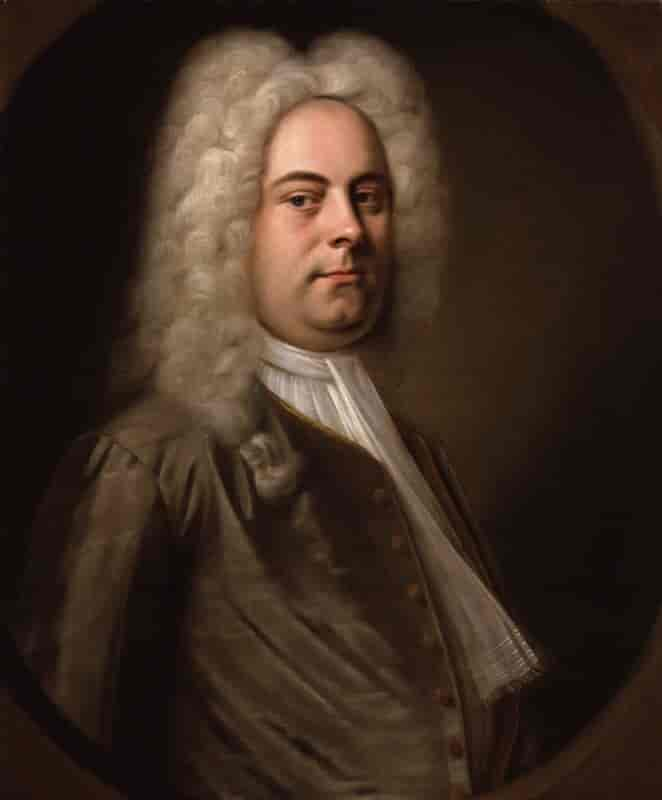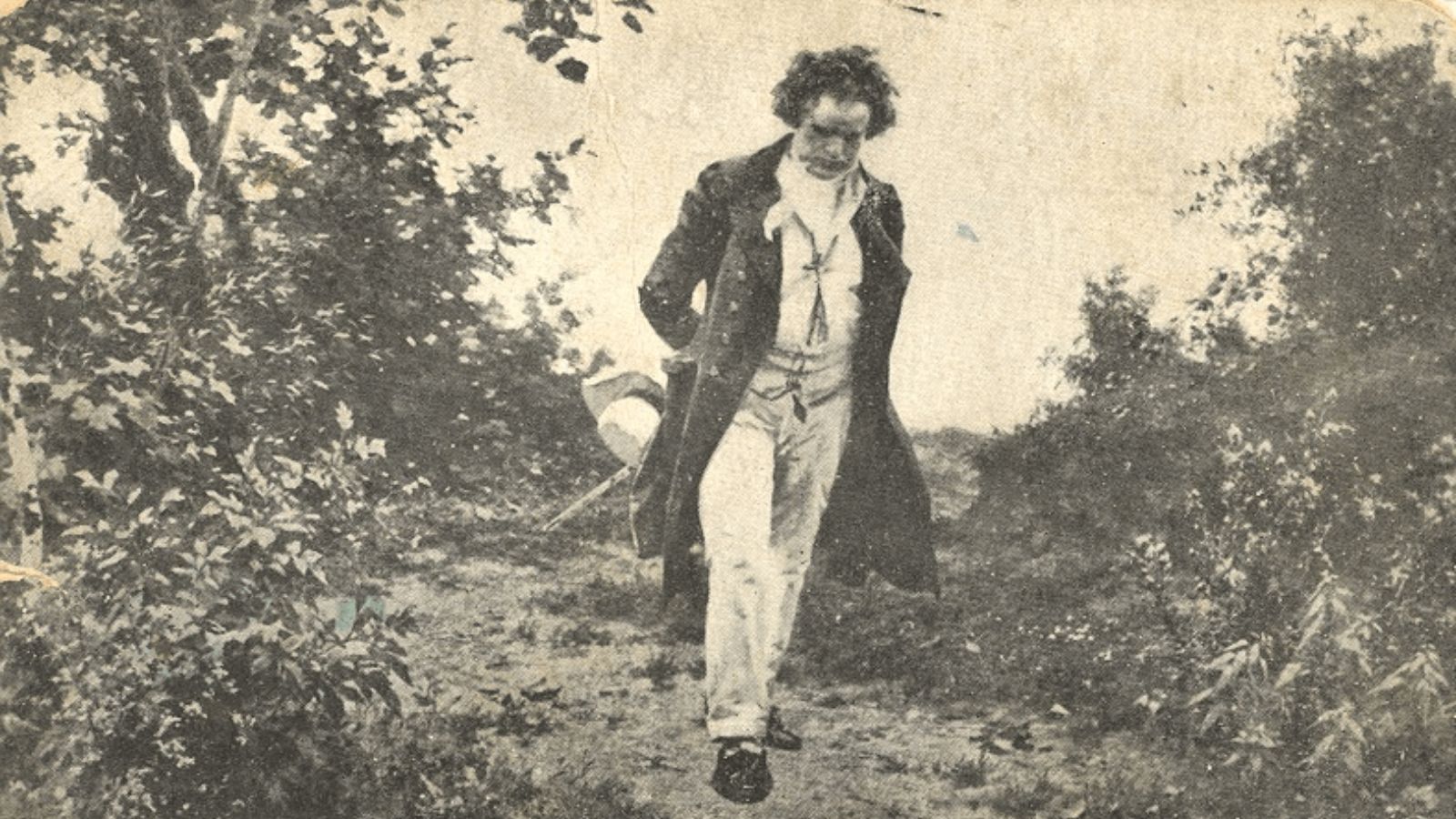
Best is quite a troublesome word to associate with almost anything, but here I have the dilemma of attributing it to German composers.
In the case of best, I’m also adding the word popular into the mix and hope I’m forgiven for any composers who are not, but deserve to be included here.
The Best German Composers
Hildegard of Bingen (1098-1179 – Saint Hildegard)
Hildegard was remarkable for so many things during her long life. She was a polymath, theologian and composer. Hildegard composed around 77 songs that are a cycle to accompany the church year.
This collection is called the Symphonia armoniae celestium revelationum. Hildegard additionally wrote what is often considered to be one of the first morality plays, which she titled Ordo Virtutum.
Alongside her compositions, Hildegard wrote three theological texts, poems and an impressive 400 letters. Her texts on medicine and botany are still the subject of great interest. Hildegard’s premise that if you care for nature, nature will care for you is an interesting point for discussion.
Hildegard’s music astonishingly did not come to the ears of many until 1979 when on the 800th anniversary of her death Phillip Pickett presented a performance of four of Hildegard’s songs.
From here significant interest was rekindled in Hildegard, her life and music. Her music is monophonic but not ordinary monody. Hildegard’s melodies are glorious with the freedom of improvisation at times. They are melismatic, deeply reflective of the Latin text and meticulously structured.
JS Bach (Eisenach, Germany – 1685-1750)
One of the most fascinating and outstanding composers to come from Germany. JS Bach and his dynasty that followed, carved out the sound of Baroque music and established practices and principles that flowed onwards into the next periods of music.
He was a master of the fugue and counterpoint with an enviable facility for melody. JS Bach’s catalogue of works is huge, numbering over a thousand. These include Masses, Oratorios, Concertos, Chorales and a vast quantity of keyboard music.
Amongst his most well-known compositions are the 48 Preludes and Fugues, Mass in B minor; St Mathew Passion, French and English Suites and the Brandenburg Concertos.
JS Bach was a phenomenal organist, harpsichordist, violinist and viola da gamba player. His powers of improvisation were legendary.
GF Handel (Brandenburg, Germany – 1685-1759)
Handel has composed some of the most recognisable and adored works to come from the Baroque period. He is perhaps known primarily for his operas and oratorios that include Messiah. Of equal fame are Water Music and Music for the Royal Fireworks.
Handel, following an extended period of travel in Italy as a young composer, showed complete mastery of the Italian style. Handel wrote many operas in this time that gave him his first step on the ladder of good fortune and recognition.
He decided to travel to England in 1710 which began his close association with the country and its soon-to-become King, George the First.
A few years later in 1718, Handel was appointed Director of Music to the Duke of Chandos and eventually became the composer for the Royal Chapel (1727). The operatic works that Handel penned from this perfect promotion were immensely successful. Handel is thought to have composed forty such works.
By 1737 however, fortune stopped smiling on Handel. He went bankrupt and is thought to have suffered a stroke. Handel returned to Germany to recover from his stroke and soon set to composing his oratorio Saul and Israel in Egypt (1739).
In 1741 his oratorio Messiah was completed in an incredibly short window of time and secured Handel’s position amongst the ranks of the nobility and success.
Felix Mendelssohn (Hamburg, Germany – 1809-1847)
Mendelssohn was one of the most important Romantic composers. In his brief life, he composed some of the most performed music from that period. Mendelssohn’s music output includes concertos, symphonies, and much chamber music.
Very early into Mendelssohn’s life he was recognised as a prodigy. His sister Fanny was also a gifted composer who published early works under her brother’s name. Mendelssohn’s music was never extravagant but never lacked exuberance and ingenuity.
Amongst his compositions are works such as The Hebrides Overture, A Midsummer Night’s Dream, the Italian Symphony and Violin Concerto. Mendelsohn is credited with starting a revival of JS Bach’s music following his performance of the St Mathew Passion.
Ludwig von Beethoven (Bonn, Germany 1770-1827)
For many, Beethoven is considered to be the greatest composer who ever lived. His life was threaded through with tragedy most notably in the form of deafness. This, unimaginably, did not stop Beethoven from composing although it brought him close to ending his life.
Beethoven spans the end of the Classical period and the dawning of the Romantic. His catalogue of work contains music that has become globally venerated and performed.
Beethoven composed nine symphonies, four piano concertos, and 32 Piano Sonatas, alongside many other choral and chamber pieces.
What makes Beethoven stand out as a composer is not only how he charts the transition from one era to another but how his work never ceased developing.
Beethoven’s immense capacity to squeeze out every creative drop of energy from a musical motif and create robust, dramatic, structures, for me is seldom surpassed.
Clara Schumann (Leipzig, Germany – 1819-1896)
Rather unjustly, Clara Schumann is often only associated with her famous husband Robert Schumann. What is sometimes overlooked is that Clara Schumann was not only a virtuoso pianist but also a brilliant composer.
How Clara Schumann managed to find any time to compose or perform with an increasingly ill husband and eight children is tough to imagine. Her compositions number only twenty-three but each is an exquisite piece, meticulously composed and with a distinct musical voice.
My personal favourite is Clara’s Piano Trio in G minor (1846) which captures her fluency as both composer and pianist. Following the tragic death of her husband, Clara Schumann stopped composing.
Richard Wagner (Leipzig, Germany – 1813-1883)
As a young man, Wagner was attracted to a bohemian lifestyle. He was not sufficiently disciplined or patient with the schooling he was offered although his devotion to music and especially composition was evident.
Wagner largely taught himself the piano with his compositional studies comprising detailed analysis of the scores of past masters.
Early attempts at operatic composition, for which Wagner became renowned, were not successful leaving him badly in debt. Wagner duly absconded to Paris where he tried to break into the operatic world. That was an equal disaster leaving him almost penniless, surviving on writing articles on music.
1840 was the breakthrough year for Wagner and his opera Rienzi, followed a year later by Der fliegende Holländer (The Flying Dutchman). Wagner enjoyed a firm degree of success with these works and was appointed the conductor of the Court Opera where he remained until 1849.
Further operatic achievements followed culminating, many would argue, in the Der Ring das Nibelungen. This is an epic series of four operas, Das Rhinegold; Die Walküre, Siegfried and Götterdämmerung, that roughly equates to fifteen hours of opera.
In this monumental work, Wagner fused his love of Norse myths, poetic drama and leitmotif. Wagner’s mature style showed an unparalleled gift for immense musical structures couched in some of the most luxurious orchestrations you’ll ever hear.





Come on…… how can you not include Brahms?
Beethoven composed ‘4 piano concertos’, really?
We can’t leave out Mozart. So what if he was Austrian! I’d put him at the top of the list of Germanic composers.